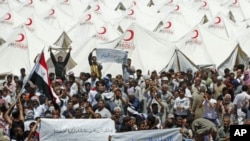Turkey appears to be fast losing patience with its Syrian neighbor. Ankara until recently had been emphasizing dialogue with Damascus. But with the number of Syrian refugees passing the 10,000 mark, the Turkish government now could be looking to more drastic steps to stem the growing tide of refugees.
With Syria's crackdown on dissent showing little sign of ending, the number of refugees entering Turkey continues to grow. The three refugee camps built by Turkey on the Syrian border now are reportedly full. Turkey is concerned that even more displaced Syrians are believed to be camped just on the other side of the border. In an attempt to stem the flood, Turkey's foreign minister announced that help now will be extended across the border.
Ahmet Davutoglu said Turkey's message to Syria is that it will not close the border. The foreign minister said the government has decided to help Syria meet its urgent need for food and other humanitarian assistance. He said there are more than 10,000 people at the moment, just over Turkey's border, on the other side of the barbed wire.
Davutoglu gave no details about how and when the initiative would take place. He also repeated Turkey's call for the Syrian leadership to start introducing reforms. The announcement came after his meeting with senior Syrian envoy Hassan Turkmani. On arriving in Turkey, Turkmani tried to play down the refugee crisis.
"Our citizens are staying for a short time here in Turkey but soon they will return," he said. "We are preparing everything, and they are returning actually."
But observers say such words are expected to do little to calm Ankara's growing alarm and impatience with Damascus over the deteriorating situation. Turkish Prime Minister Recep Tayyip Erdogan has in the past weeks toughened his criticism of Syria, accusing its security forces of committing atrocities.
Sinan Ulgen of the think tank Edam said Turkey is haunted by past experiences.
"In 1991, when Saddam had started to massacre his Kurdish population, Turkey ended being host to 550,000 Kurds in a few days. That still remains on the consciousness of Turkish policymakers."
Senior diplomats and government advisers have told reporters off the record about the possibility of Turkey creating a safe haven for refugees in Syria. For the past decade, the two countries have had close relations, but it is unclear how Syria would react if Turkey, its former colonial master, would send troops into its territory.
Political scientist Soli Ozel of Istanbul's Kadir Has University said Ankara would be very reluctant to take such a step.
"How do you do it? Do you send troops and face the Syrian army? I don't think the Turks are really interested in do [doing] that," said Ozel. "I am more inclined to think that will become an option if the Kurdish population to the east of border and the Syrian troops go there. And lots of Syrian refugees start coming up from there. That's when Turkey will stop things before they reach the border. Because they don't want a repeat of '91 when lots [of] Kurds flooded into Turkey - among those are elements not necessarily very amicable to Turkey, that is the PKK and others."
The PKK is a Kurdish rebel group that has been fighting the Turkish state for greater minority rights since 1984. Next to Turkish Kurds, Syrians are believed to make up the largest component of the rebel group. But observers say even the suggestion of such an intervention may force Damascus to take more seriously Turkish calls for an end to the violence, and introduce reform.
Senior Turkish diplomat Selim Yenel said there is still time for Damascus to change course.
"We still think it's not too late [for an] initiative. We do hope as soon as possible," said Yenel. "That's why we have voiced our concerns to the Syrian authorities. We hope that they will be heeded. But if these events continue on and on, then we don't know how things can mushroom."
With Syrian troops reportedly now moving to northeastern Syria, home to many Syrian Kurds and a region that borders Turkey's own restive Kurdish region, comes the threat of further waves of refugees that observers say could be one step too far for Turkey.
Turkey Concerned About Growing Tide of Syrian Refugees
- By Dorian Jones
















